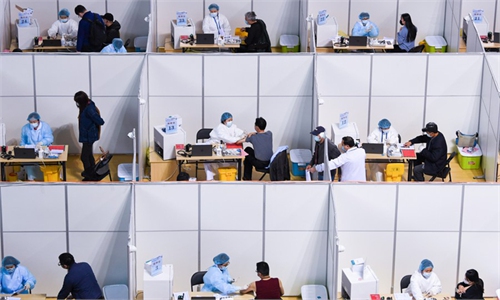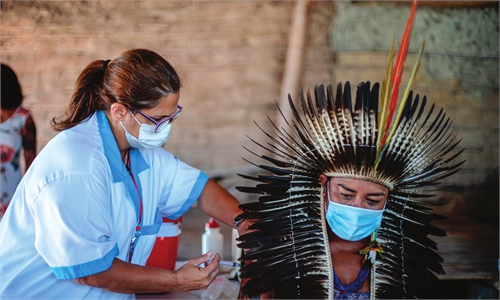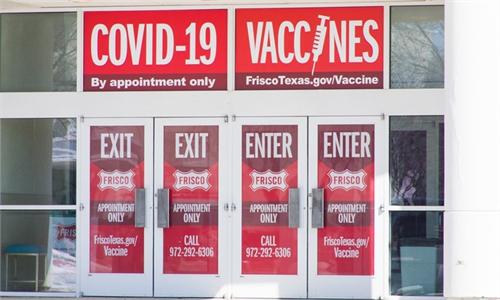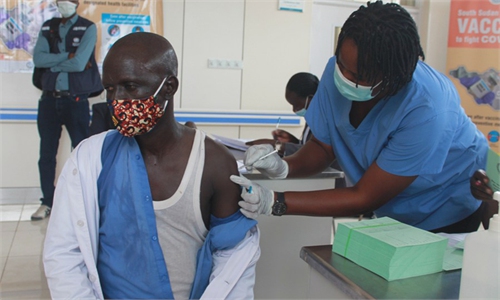China’s first mRNA vaccine expected to enter Phase III trials in LatAm, paves way for mixed jabs against variants
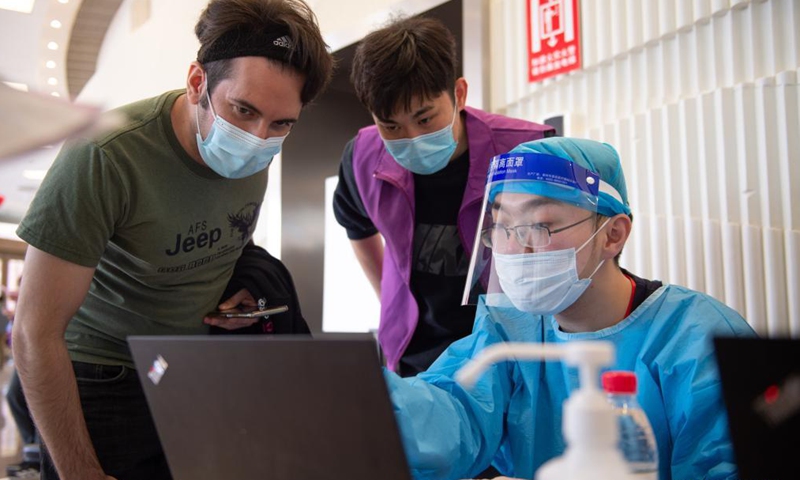
A foreign recipient (L) gets registered for a dose of Sinovac COVID-19 vaccine at a vaccination site in Tsinghua University, Beijing, capital of China, April 3, 2021. Beijing has recently started COVID-19 vaccination for foreign nationals in the city. Foreign nationals aged 18 and above may, following the principle of voluntary participation, giving informed consent and assuming personal responsibility for risk, take the COVID-19 vaccine. (Xinhua)
The first China-developed mRNA COVID-19 vaccine is expected to enter Phase III clinical trials overseas next month, vaccine developer Suzhou Abogen Biosciences confirmed to the Global Times on Tuesday, another step forward in China's vaccine development despite attacks from Western media on the efficacy of Chinese doses.Production capacity for the new vaccine could reach some 120 million doses this year, according to the company's founder Ying Bo, which will be a major breakthrough in domestic mRNA vaccines' research and development (R&D).
It is believed that China's vaccine options will be enriched if the mixed use of different types of vaccines - inactivated, mRNA, or adenovirus ones - can deliver a better performance, experts noted.
Being able to be stored and delivered in the usual range of 2-8 C will make this domestic ARCoV version stand out from Western-dominated mRNA vaccines made by pharmaceutical giants Pfizer-BioNTech and Moderna, which require much lower temperatures and more rigorous temperature controls.
"From animal and clinical trial results, we see that ARCoV is fairly competitive with the other two mainstream mRNA vaccines in overseas markets," Ying said during an interview with China National Radio on Tuesday.
In a report on animal studies published in the journal Cell, the research team at the Academy of Military Medical Sciences, the new vaccine's co-developer, found the vaccine is still effective after being stored for up to seven days at room temperature.
This allows ARCoV to significantly reduce the challenges of cold-chain transportation, and potentially offer a viable alternative for some developing countries facing difficulties in ultra-cold chain logistics, medical observers suggested.
"Technically, the producer may control the temperature with a conditioning modifier," Feng Duojia, president of the China Vaccine Industry Association, told the Global Times on Tuesday.
The producer is applying to start ARCoV's Phase III trials overseas, likely in Latin American countries, expected in early May, said Ying.
Though there have been some debates among global researchers, some senior Chinese advisors - including Gao Fu, head of China's CDC - have encouraged the use of sequential inoculation with different types of vaccines. Ying proposed the same solution to better cope with coronavirus variants that are increasingly common in more regions worldwide.
Abogen announced the completion of a B round of financing totaling 600 million yuan ($91.6 million) last week amid efforts to accelerate vaccine R&D and production.
As Chinese researchers ramp up efforts to diversify the nation's vaccine choices, some foreign media have not stopped spreading misrepresentations by quoting incomplete data or groundless claims to question Chinese vaccines' safety and efficacy.
Chinese researchers and producers, however, have not given up their attempts to prove their vaccines' credibility via sound, detailed and comprehensive data.
China's main producer Sinovac on Sunday revealed its specific late-stage trial data in Brazil in an academic journal. Simultaneously, the company revealed its peer-reviewed Phase I and II results of its vaccine's trails on minors. Sinovac's vaccine was well tolerated and induced strong neutralizing antibody responses in children and adolescents aged 3-17 years.
The study provided solid safety and immunogenicity data for its use, read a report the Global Times received from Sinovac.
Ukraine has completed laboratory studies of Sinovac's vaccine and is starting to roll it out across the country, the country's health minister said on Monday, after Ukraine officially registered it on March 9.
In contrast to doubts and skepticism, some foreign diplomats in China posted photos of their inoculations with Chinese-made vaccines on their social media accounts, among a recent national campaign to start inoculation arrangements for expats living in cities including Beijing and Shanghai.
The Global Times learned from a diplomat at the Mexican Embassy in China that officials and family members aged between 18 and 60 in the embassy received vaccines in the same way as other embassies in Beijing, with supportive arrangements of the Chinese Foreign Ministry.
The Iranian Embassy in China also "advertised" the Chinese vaccine on its official Weibo account, showing its confidence and trust to the vaccine.
Organizations such as the American Chamber of Commerce in China (AmCham China) have also been helping to organize vaccinations for foreign nationals in Beijing, a person familiar with the matter confirmed to the Global Times on Tuesday. The chamber is advocating for open market access for all vaccines in China, while also supporting policies that lead to a loosening of travel restrictions, the person said.
Keri-Lee Beasley, a coach at the Western Academy of Beijing: International School in Beijing, who got her first dose on Monday, described the process in a tweet.
"The volunteers were so helpful - translating for us, ensuring we understood the forms, escorting us through each section. Do Asian people living in Western countries get the same treatment? Why the hell not?"


